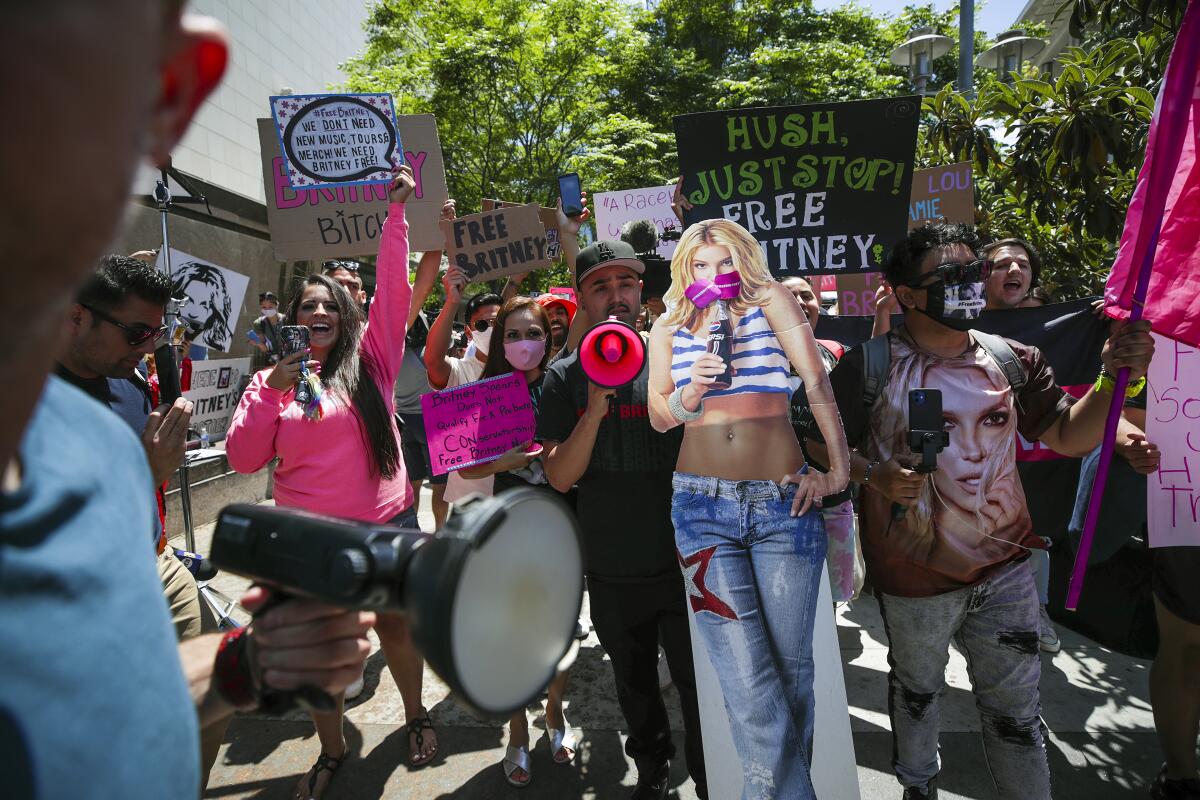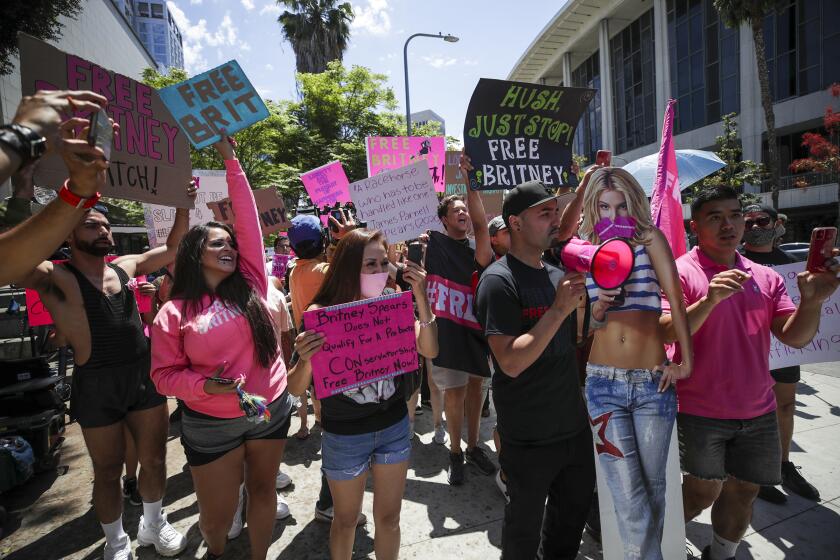Britney Spears upended her conservatorship case. Now what? These attorneys weigh in

Britney Spears had her day in court Wednesday, but what her future holds is much less clear than the emotional message that came out during her 23-minute speech before a judge.
“Now I’m telling the truth, OK, I’m not happy,” the singer said via phone at her conservatorship hearing in L.A., more than two years after the last time she appeared in court. “I’m so angry it’s insane, and I’m depressed. I cry every day.”
The pop star, whose person and finances have been under conservatorship since 2008 after her mental health unraveled publicly, painted a picture of a woman whose life is under micro-control, absent ordinary freedoms and courtesies including privacy and control of her reproductive choices.
She described a woman who was angry, fed up and wanted out. A woman who wanted to be able to ride in her boyfriend’s car and get her nails done.
Addressing the court for the first time in two years, pop star Britney Spears was candid and emotional at her conservatorship hearing Wednesday.
Cut and dried, right? Not exactly.
“Once the system gets ahold of you ... whether it’s a county- or a court-supervised private conservatorship, they will drain your money and it is really hard to get out,” attorney Peter Walzer said in a phone interview Thursday. “I think that’s important to know.”
Walzer, a founding partner in the Walzer Melcher family law firm in Woodland Hills, which often deals with conservatorships, said it’s on Spears now to push the process forward if she wants her conservatorship terminated.
Apologizing for her “ignorance,” the singer told Judge Brenda J. Penny on Wednesday that she never knew she could petition to end the legal arrangement. But she also said she wanted it terminated without a medical evaluation, which could be legally challenging. The implication was that nobody informed her of her rights over the last 13 years.
“It could have been that she never asked” about her rights, Walzer said, noting that it was “impossible to know” the relationship between a lawyer and a client. “She might not have trusted the attorney the court appointed.”
Britney Spears has been under a conservatorship since 2008. Before her virtual appearance at a court hearing today, here’s a deep dive into her case.
A source who has worked on many conservatorship cases wondered Thursday, “If she had the lawyer she wanted from the beginning, how would things be different?”
Spears’ case is unusual for many reasons, including one order that prevents her from seeing court pleadings and another that prevents her from talking to any attorney without her court-appointed attorney present.
“There’s been a terrible miscarriage of justice. She’s been deprived of her rights,” attorney Adam Streisand, who used to represent Spears, told CNN Wednesday night. “She’s never had anyone who has advocated for her.”
Streisand said that when he had spoken with Spears many years ago, around the inception of the conservatorship, “She was making sound judgments.” He also noted that she specifically did not want her father, Jamie Spears, in charge of her life — as he has been for most of the last 13 years. Streisand said the court told him he could not represent Spears because she was “unable” to hire her own representation.

Samuel Ingham III, Spears’ court-appointed attorney since 2008, said toward the end of the hearing Wednesday that he would do whatever his client directed him to do, even if that meant helping her obtain her own new legal representation.
“When it comes to the decision of whether or not to remove the conservatorship, the judge has to ultimately consider the best interest of the conservatee — in this case, Britney Spears,” said Sabino Biondi, a trust and estates attorney and partner at Wilk Auslander LLP in New York City, via email.
“Even though she is an adult and appears competent and ready to take over her own affairs, the court has the discretion and responsibility to decide if it is in Britney Spears’ best interest to remove the conservatorship. If the judge has any concerns that she might not be responsible enough to handle her own financial affairs, [the judge] won’t remove it.”

Walzer said that in his experience some people under conservatorships can convince their attorneys and others, absent additional information, that the legal oversight isn’t needed. But a court hearing that allows the other side to present its case — that the person is a harm to themselves or others — can quickly change that impression.
There are, however, people who “get better” from the situation that landed them under supervision in the first place. In Spears’ case, the details of the initial situation remain unclear to the public.
Spears presented her side of the story to the court Wednesday without any challenges from others involved with her legal arrangement or her care. Ingham made a point up front of saying that he wouldn’t interfere with her appearance in any way and said he had no influence over what she intended to share.
Samantha Stark, who directed “Framing Britney Spears,” says that creating the documentary without the singer’s permission “was a huge internal conflict for me.”
“The only way I see the judge removing Britney Spears’ father as conservator is if the judge feels that he has mishandled her financials, and has been detrimental to her,” Biondi said. “But even then, the judge may just replace her father with another conservator. Unless the judge is absolutely certain that she can take care of her own affairs, a conservatorship will remain in place, and I just don’t see that happening yet.”
Typically, conservatorship over a person is more restrictive than one over an estate, Walzer said, and there’s no reason Spears shouldn’t continue to have a firm such as Bessemer Trust oversee her money. Jodi Montgomery is the fiduciary temporarily overseeing her person. But, Walzer added, “There’s no reason her father should be a co-conservator with Bessemer if she objects. ... A lot of people have problems with their parents controlling them.”
After more than a decade, why is Britney Spears still under a court-approved conservatorship, which leaves decisions involving her estate and everyday life to others?
“If there’s a less restrictive option” that allows a person to successfully manage their own life, Streisand told CNN, “then the conservatorship can’t stand.”
Spears expressed serious concerns Wednesday about being told that she couldn’t remove an IUD from her body in order to have another child. She has only partial custody of teenage sons Sean and Jaden, her children with ex-husband Kevin Federline, and has been in a relationship with boyfriend Sam Asghari since 2016. She said she’d like the freedom to get married again too.
“This so-called team [of conservators] won’t let me go to the doctor to take [the IUD] out because they don’t want me to have ... any more children,” Spears said in court.
In new court documents, Britney Spears supports the #FreeBritney movement and is ‘vehemently opposed’ to her father sealing her conservatorship case.
Whether the birth-control situation has been an ongoing issue or something that cropped up spontaneously in court, it puts time pressure on the case, Walzer said. The L.A. court system is not known for its speed, and the 39-year-old singer is at an age where her fertility is likely rapidly declining.
“It’s so extraordinary and controlling,” Walzer said, referring to Spears’ IUD allegations and noting that she likely consented to the intrauterine device in the first place but has since changed her mind. “That doesn’t mean it’s the right thing for her to have a child, but does she have that right? We all have a right to do stupid things. And we’ve exercised that right many, many times.”
Walzer said he would focus on pushing the court to have an emergency hearing regarding the issue.
Applying the rigor of “Frontline” to the story of her conservatorship, “Framing Britney Spears” is a pointed work of criticism aimed at celebrity culture.
The source with conservatorship experience noted that while it’s not unusual for conservators to have control over a conservatee’s “social and sexual contacts” — especially in the case of developmentally disabled conservatees, or those with dementia — he had never heard of those instructions being interpreted as Spears’ conservators appear to have done. He likened her story to one of “forced sterilization.”
“Why,” he asked, “did the conservators think that was OK?”
More to Read
The biggest entertainment stories
Get our big stories about Hollywood, film, television, music, arts, culture and more right in your inbox as soon as they publish.
You may occasionally receive promotional content from the Los Angeles Times.















